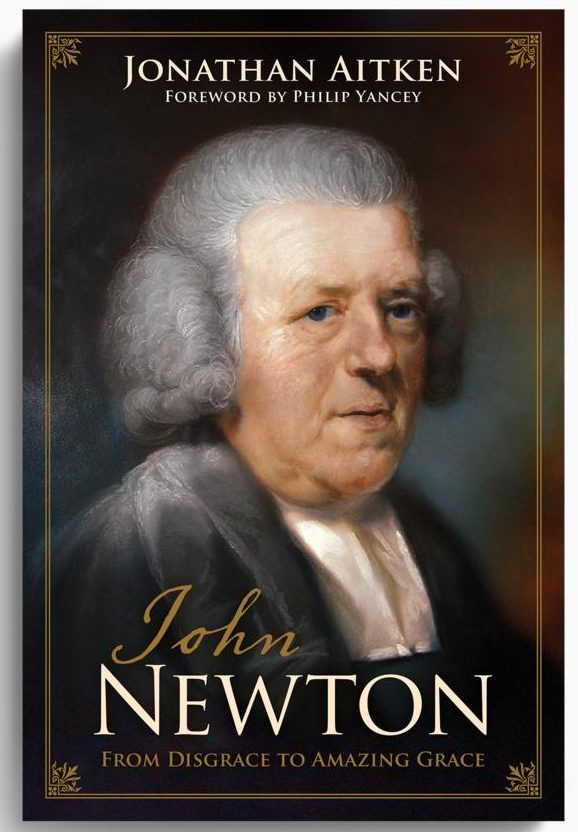CHAPTER 46
A Great Sinner and a Great Savior
What is death to a believer in Jesus! It is simply a ceasing to breathe. If we personify it, we may welcome it as a messenger sent to tell us that the days of our mourning are ended and to open to us the gate of everlasting life. The harbingers of death, sickness, pain, and conflict are frequently formidable to the flesh, but death itself is nothing else but a deliverance from them all.
These words, written by Newton six years before he died in a letter to Hannah More, show how spiritually well prepared he was for his departure from the world. His later diaries also recorded many prayers asking God to help him meet his end with a faithful spirit:
Oh for grace to meet the approach of death with a humble, thankful, resigned spirit becoming my profession. That I may not stain my character by impatience, jealousy, or any hateful temper but may be prepared and permitted to depart in peace and hope and be enabled, if I can speak, to bear my testimony to thy faithfulness and goodness with my last breath. Amen.
In the final twelve months of his life, despite his growing frailties of body and mind, this preparedness he had prayed for grew stronger, even though it was visible only occasionally. For in the closing stages of his journey, Newton’s mind could be compared to a malfunctioning but still operating lighthouse that punctuated long periods of darkness with irregular but illuminating flashes of light.
Newton’s most devoted companion throughout 1807, the last year of his life, was his adopted daughter Betsy. She and her husband, Joseph Smith, had moved into 6 Coleman Street Buildings soon after their marriage in 1805.
They looked after Newton with a love that was clearly reciprocated. “It is a pleasing and painful service to attend on him,” said Betsy. “Pleasing to see such sweetness and composure of mind that everything is right that is done for him.”
With this same sweetness and composure, Newton continued to receive a steady flow of visitors even though his power to communicate with them was limited. One of his most regular callers was the Rev. John Campbell who recorded on February 10, 1807, “Mr. Newton now confined to his bedroom, not having been downstairs for three weeks. He said, ‘I have comfort from the Word—there is much comfort in it could we take it.’”
Three months later, Newton was found to be in a noticeably worse state of health by Campbell who wrote in his journal:
Calling in the evening I found him very weak. I sat by his side about ten minutes, repeating in his ear passages of Scripture; but he spoke not a word nor took any notice of me. At last he recollected me. After prayer with him, he thanked me, and shaking my hand he wished every blessing might attend me.
One immense blessing, which must have delighted Newton when he received and understood it, was the news that Britain’s slave trade had been abolished. After twenty years of parliamentary defeats for his motions, William Wilberforce’s abolition bill was carried by the overwhelming majority of 283 votes to 16 in the House of Commons at 4 a.m. on the morning of February 24, 1807. The bill became law a month later when the Act of Abolition of the Slave Trade received the Royal Assent on March 25.
Although it is not known precisely how Newton reacted to this momentous event, he had given a clear indication of his feelings three years earlier in 1804, in a letter written to Wilberforce at a moment when the long parliamentary battle for abolition seemed to be on the verge of victory:
Though I can scarcely see the paper before me, I must attempt to express my thankfulness to the Lord and to offer my congratulations to you for the success that he has so far been pleased to give to your unwearied endeavors for the abolition of the slave trade that I have considered such a millstone sufficient, of itself sufficient, to sink such an enlightened and highly favored nation as ours to the bottom of the sea. . . . Whether I who am within two months of entering my eightieth year shall live to see the accomplishment of the work is only known to him in whose hands are all our times and ways, but the hopeful prospect of its accomplishment will, I trust, give me daily satisfaction so long as my declining faculties are preserved.
The satisfaction that Newton must have felt from knowing that the abolitionist cause had finally been won can be compared to the joy of the aged Simeon, a devout worshiper in the temple in Jerusalem at the time of the birth of Christ. “Lord, now lettest thou thy servant depart in peace” (Luke 2:29 KJV), declared Simeon.






